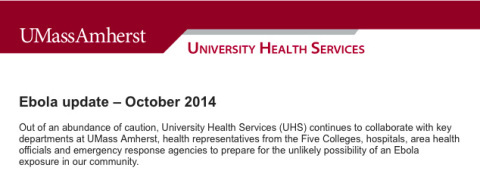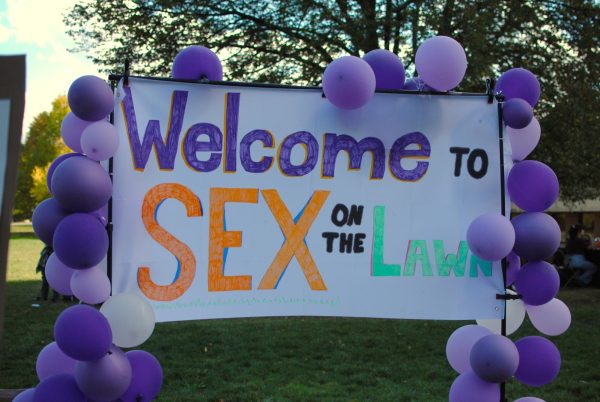Fearbola strikes UMass Amherst

The University of Massachusetts Amherst is stricken with a virus: fearbola. Its symptoms include unnecessary panic, and perhaps the most lethal of them all: unnecessary e-mails.
University Health Services sent a campus-wide e-mail to faculty, staff and students at UMass Amherst on Tuesday, Oct. 21 that included updated information on the Ebola virus that has devastated several African countries and found its way into the United States. The e-mail explained the local protocols in place for virus control and what to do if a person in the area may have been exposed to it, though no person in the UMass Amherst community has been infected.
If the following statistics do not speak for themselves, allow me to tell you: this e-mail does more harm than good. “It’s a good example of fear-mongering,” said sophomore Emily Hamel, “and I don’t understand why it is necessary.”
There is a one in 13.3 million chance an American will contract Ebola this year, according to NPR. The virus, spread solely through contact with infected bodily fluids, does not spread easily. In African countries with less advanced public health systems, the dense packing of patients and inadequate treatment tactics have allowed the virus to spread rapidly. The chance of dying in a car accident in America: one in 9,100. You are nearly 1,500 times more likely to be killed by a car than the Ebola virus. (Why isn’t Fox suggesting ISIS use cars as weapons?)
In the past month there have been four confirmed cases in the U.S., and, although it is highly unlikely these victims have spread the disease, the Center for Disease Control and Prevention states they are checking the 11 confirmed contacts and 165 “potential” contacts that may have interacted with the two Dallas nurses who cared for deceased victim Thomas Eric Duncan. One of the two nurses flew on an airplane before she showed sign of any symptoms. (Note: Ebola is only contagious when the infected person is exhibiting symptoms.)
The intensive, high-level approach adapted by federal bureaucracies has trickled down the administrative ranks to the Amherst area. While residents and students alike should be aware of the Ebola situation, it does not warrant e-mailing the entire UMass Amherst community.
With the exception of sound-checking the campus alarm or similar routine testing, a university-wide e-mail often indicates an urgent matter, such that a crime or death has occurred on campus. To place Ebola among these pertinent and critical university issues only contributes to the fear-provoking story created by American mass news outlets, a practice for which the United States has been internationally condemned.
“They should have worded it differently,” said Jack Jezard, a junior environmental science major. “Let people know what the symptoms are, but they shouldn’t make people think there’s a possibility of it coming to Amherst or Massachusetts specifically, until anything confirmed comes within the region.”
Even the front page of UMass Amherst’s daily paper, The Daily Collegian, presented “A Comprehensive Guide to the Ebola Virus.” The article mentions the low likelihood of an outbreak in the United States, but does front-page coverage contribute to the hype?
Some students felt they understood why UHS spread the word on Ebola. Grant Hespeler, a sophomore resource economics major, said he expected the message was intended to “ease the mind of the student body,” but was unsure if the e-mail was necessary.
Though, he himself admitted to quickly deleting it.
Kristin LaFratta can be reached at klafratt@umass.edu. Follow her on Twitter:@curious_kritter.










